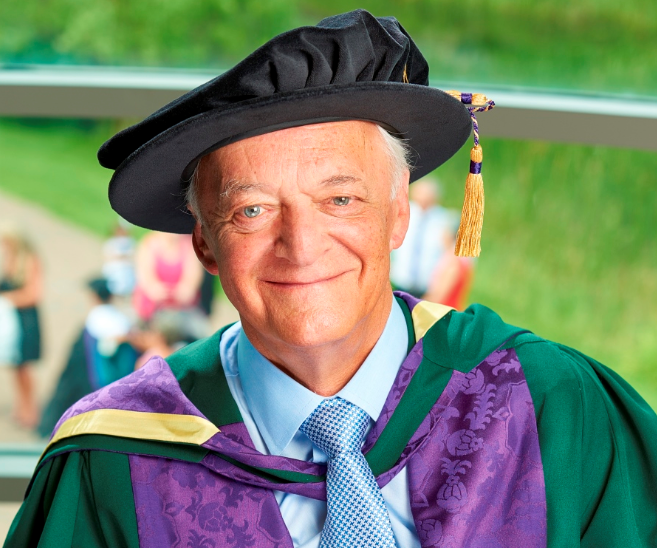You are here
- Home
- In Memory of Clive Emsley (1944-2020)
In Memory of Clive Emsley (1944-2020)

Clive Emsley, on the receipt of an Honorary Doctorate from Edge Hill University in 2016
The late Professor Clive Emsley, founder of the Centre for the History of Crime, Policing and Justice (formerly known as the European Centre for the Study of Policing), was one of the world’s foremost exponents of criminal justice history.
Born in 1944, Clive took a degree at York University (1966) and undertook further research at Peterhouse College, Cambridge University, before joining the History Department at The Open University on its foundation in 1970. Aside from a series of prestigious visiting fellowships in Australia, Canada, New Zealand and France, he remained at the OU until his retirement in 2009. Clive’s research defined and shaped our modern understanding of crime and its control via a truly exceptional number of published works.
Clive provided the first scholarly history of the English police (The English Police: A Political and Social History – published in 1991) and a ground-breaking exploration of crime and justice (Crime and Society in England, 1750-1900 – the fifth edition of which was published in 2018). More recently, innovative studies of crime and its control during wartime unearthed further surprising and important insights. Soldier, Sailor, Beggarman, Thief: Crime and the British Armed Services since 1914 (2013) was the first serious investigation of criminal offending by members of the British armed forces during and immediately after the two world wars of the twentieth century. Exporting British Policing during the Second World War (2017) demonstrated the pivotal role played by British military policing in liberated Europe during the Second World War. Clive also took criminal justice history to a more general audience, through books such as Hard Men, a study of interpersonal violence in Britain since 1750, and The Great British Bobby, an engaging history of British policing from the eighteenth century to the present.
Clive was a truly global scholar. One of his first forays into the field was Policing in Context (1983), which showed that in early 1829, before the Met began patrolling London, a similarly civilian-looking unarmed force of Serjeants de Ville arrived on the Parisian streets. Gendarmes and the State (1999) and Crime, Police and Penal Policy: European Experiences 1750-1940 (2007) continued this comparative method, in the process debunking long-standing myths about British and European policing by drawing valuable parallels in imposition of law and order. In 1995, Clive founded and served as first president of the International Association for the History of Crime and Criminal Justice, a formal network linking criminal justice historians from around the world. Two years later, in 1997, Clive co-founded the bilingual journal, Crime, History & Societies, fostering dialogue between young and established researchers in the field.
Closer to home, Clive established the European Centre for the Study of Policing at the OU in the late 1980s. It quickly became an important hub, not just for academics and students, across the UK and beyond, but also for practitioners: lists of attendees at conferences and seminars included serving and former police officers, who were keen to share their experiences and learn about the history of their profession. Over time, Clive curated a substantial archive of primary sources on the history of policing. Materials gathered during the course of his own research were supplemented with valuable artefacts and collections donated by retired police officers. Clive worked with the Police History Society, police museums, and local record offices. In 1991, together with Ian Bridgeman, Clive compiled the Guide to the Archives of Police Forces in England and Wales, which continues to be used by researchers today. History from Police Archives, an AHRC and National Lottery funded project, made a range of rare and valuable documents on the history of policing available to students and researchers online. In the early 2000s, Clive joined forces with the OU’s criminologists to set up the International Centre for Comparative Criminological Research (now known as HERC) to encourage collaboration between social scientists and historians. Criminologists all over the world drew on his ongoing work.
Clive’s success in establishing thriving networks of scholars and practitioners of all stripes was attributable to his exceptionally warm and generous nature. He was a supportive mentor to many young scholars and helped to nurture the careers of two generations of historians who followed in his footsteps. Intellectually as well as socially, he treated research as a collective project, in which a worldwide group of scholars (and others) who shared his curiosity about the past could work co-operatively to generate and disseminate answers.
Clive Emsley, pioneering historian and enthusiastic wine connoisseur, born 4 August 1944; died 5 October 2020.
The British Crime Historians Symposium (2021) held a round table discussion in honour of Clive and his work. A recording of this event can be accessed here.

Contact us
Please direct enquiries about the Centre, including its facilities and access to its resources, to Dr Chris A. Williams:
Department of History
Faculty of Arts
The Open University
Walton Hall
Milton Keynes
MK7 6AA
Telephone: +44 (0)1908 652477
Fax: +44 (0)1908 653750
Email: Chris.Williams@open.ac.uk